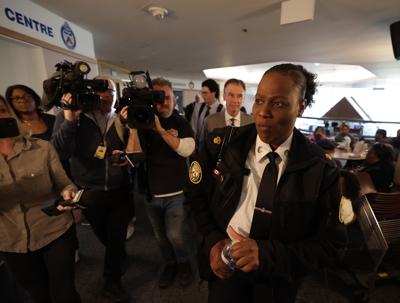In Canada a cheat is often hailed as a hero, especially during Trudeau's tenure.
‘A desperate effort to level the playing field’: Senior Toronto cop says she helped Black officers cheat to fight structural racism
“I decided that if the opportunity presented itself, I would assist the candidates and make a desperate effort to level the playing field,” Supt. Stacy Clarke said.
Updated May 6, 2024 at 9:01 p.m.

Toronto police Supt. Stacy Clarke, the first Black female superintendent in the 183-year history of the Toronto Police Service, walks past supporters and news media at police headquarters on Monday.
Steve Russell Toronto Star

By Wendy GillisCrime Reporter
It was, in her own words, “a desperate effort to level the playing field.”
In November 2021 — after a history-making ascent to become the highest-ranking Black woman in Toronto police — Supt. Stacy Clarke found herself in a powerful position: deciding officer promotions. She’d long advocated for diversifying the force but that day, as she lobbied among her peers for six promising Black candidates she’d mentored, she said she felt her advocacy being ignored.
To Clarke, who knew the “soul-crushing underbelly of police culture,” it seemed the candidates didn’t stand a chance. Even while wearing the hard-earned white shirt of a senior officer, Clarke felt “invisible,” she said.
“I felt at the time that they did not have a fair chance in this process and my own history and experience of racial inequity compounded this feeling,” Clarke wrote in a January 2022 internal police report, made public Monday at her sentencing hearing inside Toronto police headquarters.
“I decided that if the opportunity presented itself, I would assist the candidates and make a desperate effort to level the playing field.”
Monday’s proceeding was the first time Clarke has aired her motivations for texting photos of interview questions to six Black officers vying to be promoted to sergeant — an act that erupted in scandal within the Toronto Police Service. The four-day hearing is being held for arguments on Clarke’s penalty after she pleaded guilty last fall to seven counts of professional misconduct under Ontario’s Police Services Act, an admission likely to cost her her trail-blazing title.
A busload of supporters coming from the Jamaican Canadian Association arrive at Police headquarters.
But as Clarke’s rationale came to light, and as witnesses — including Mark Saunders, the force’s first Black chief — took the stand to defend her character, the proceeding at times felt more like a public inquiry into anti-Black racism and discrimination within policing.
“We say we are striving for equity and inclusion, but my personal experiences have come into conflict with that notion,” Clarke wrote in her letter, read onto the record by her lawyer, Joseph Markson, who in his opening statement said his client had been “running uphill, against the wind, for 26 years” within the force.
Helping the next generation of Black officers cheat was, he said, a “desperate act of equalization.”
Community members and Clarke’s supporters packed nearly every seat in the Toronto police headquarters auditorium for the hearing. The sheer number of attendees, some coming by bus from the Jamaican Canadian Association, prompted the move to the larger room from the usual tribunal office; at breaks, scores of supporters walked up to give hugs to Clarke.
Police prosecutor Scott Hutchison said Clarke’s misconduct — which prompted a freeze on promotions across the service — might reasonably warrant her dismissal but he stated he won’t be arguing for that; Chief Myron Demkiw has said he still believes Clarke has value to the force. Instead, Hutchison asked hearing officer Robin McElary-Downer, a retired South Simcoe Police deputy chief, to knock Clarke down two ranks for a year (to staff sergeant), then down one for another year (to inspector), then force her to reapply for her superintendent rank.
“The conduct in question is incredibly serious within the context of a policing organization,” Hutchison said.
Markson asked for a demotion of one rank for one year or 18 months, and that Clarke be automatically reinstated to superintendent.
He implored McElary-Downer to take into consideration the broader cultural context of Clarke’s actions, saying Clarke acted because of a “genuine perception that inequitable factors were impacting the promotional process” and her lived experience as a Black, female officer.
The tribunal heard that as Clarke worked her way up the ranks, her success was repeatedly second-guessed. In her explanatory letter to professional standards, she wrote: “I’ve had to prove myself over and over to all the naysayers and doubters who believe my ascent through the ranks is solely due to the colour of my skin. I’ve had to jump through hoops that were created just for me.”
Markson told the tribunal she’d been labelled as too loud and heard hurtful and devastating comments, like, “‘She’s not blue enough,’ and in some cases, ‘She’s too Black,’” or, “Take your racial profiling course somewhere else.”
In 2020, the year before her misconduct, she said she had been experiencing acute stress amid the crisis of public trust rocking policing across North America after the police murder of George Floyd in Minneapolis. Clarke was in charge of the police response to public protests against racism within policing, but was also called upon to be the public face of progress and change within Toronto police. The weight of the dual role “was suffocating,” she said in her letter.
“Locally, communities were recounting horrific experiences with the Toronto Police Service while internally, members who had never spoken up began to share their lived experiences in the Toronto Police Service, having faced (and) endured racial harassment, bullying, workplace harassment, loss of career opportunities,” she wrote.
Markson told the tribunal his client was “extremely remorseful,” however her actions were “rooted in a real despair, a real hurt and in a real pain.”
Saunders, who served as Toronto’s first Black police chief from 2015 to 2020, briefly took the stand Monday as a character witness for Clarke, telling the tribunal she was an “excellent” police leader who excelled at everything she did.
Asked if he understood the seriousness of Clarke’s misconduct, Saunders said he did — “and I think, more importantly, Supt. Clarke understands the weight of this too,” he said, noting she’d pleaded guilty at the tribunal.
But it was not the Clarke he knew.
“This is totally out of character by any stretch of the imagination,” he said.
Quipping that he was glad he was not in the hearing officer’s chair, and didn’t have to decide on the penalty, Saunders nonetheless said Clarke still had much to give the police force. He noted her misconduct was not done to benefit herself, and was not as serious as other kinds of police misconduct, including the type that can physically harm a member of the public.
“I think she should return,” he said.
Audrey Campbell, former president of the Jamaican Canadian Association, and who worked closely with Clarke on anti-Black racism initiatives within policing, told the tribunal she should not face a disproportionately severe consequence. Campbell referenced other serious cases of misconduct by veteran officers, including that of Supt. Riyaz Hussein, who was demoted to the rank of inspector for 12 months after driving drunk on Highway 401 in a police-issued SUV.
“If you punish her harshly, it would validate everything we have seen throughout history: Black people are punished harder,” she said. “She’s a senior officer. What was her crime? Trying to help. Trying to help others,” she said.
The hearing resumes Wednesday.

Wendy Gillis is a Toronto-based reporter covering crime and policing for the Star. Reach her by email at wgillis@thestar.ca or follow her on Twitter: @wendygillis. |




